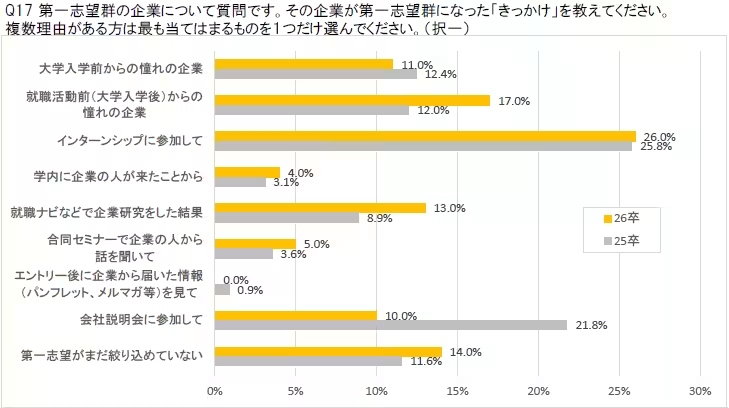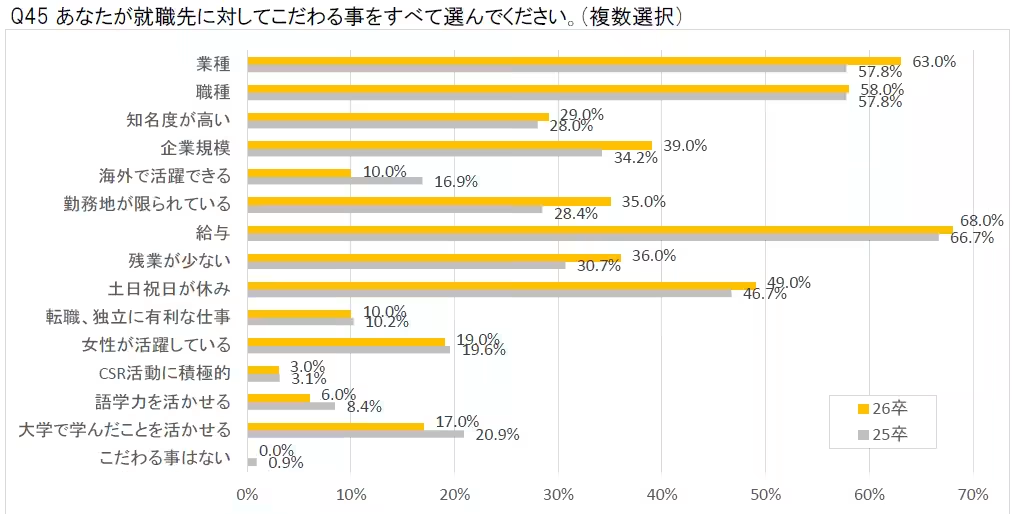

Recent Survey Reveals Graduate Preferences for Job Salary and More
Overview of Graduate Employment Preferences
In a survey conducted by Bunka Broadcasting Career Partners in early April 2025, insights into the job preferences of students graduating in 2026 were gathered from 100 respondents. The results highlight a growing emphasis on salary and a changing perspective on employment opportunities among new graduates.
Key Findings
Aspirations and Influencers
The survey revealed that 26.0% of students identified internships as the primary reason for choosing their preferred company, followed by 17.0% who had long admired their dream companies even before starting their university journey. However, participation in company presentations saw a significant decline, dropping to 10.0%, which is an 11.8% decrease from the previous year. This shift may indicate a change in how students are integrating their job search processes with actual workplace experiences.
Salary Still Reigns as Top Priority
Continuing a trend from previous years, a striking 68.0% of respondents prioritized salary as a key factor in their job search, reflecting a 1.3% increase. Following salary, 63.0% of students placed importance on the type of industry they wish to enter, with a slight increase of 5.2%. Furthermore, 58.0% emphasized the importance of their job type, indicating consistent priorities among these new graduates.
Interestingly, areas such as opportunities for overseas work, utilizing their university studies, and leveraging language skills showed a decline in interest. This suggests that recent graduates may be feeling more secure in their choices and are prioritizing immediate financial gain over potential long-term benefits.
Engagement with Recruitment Services
The survey also noted that 50.0% of students have registered for or utilized a new graduate recruitment agent service. Most students find these services helpful for interviews, self-analysis, and preparation, which reflects a practical approach to job seeking. In contrast, 84.0% of respondents stated that they had not considered paid job training services or seminars, which may indicate a shift towards more cost-effective, self-guided job search strategies.
Ongoing Job Search Trends
The survey also highlights some general trends in the job seeking process among students:
- - Ongoing Job Search: Only 40.0% of students reported that they were still looking for job offers, showing a decline in active job hunting.
- - End of Job Search: In contrast, 24.0% indicated they had concluded their job search, up from the previous month.
- - Application Statistics: The range of companies students applied to mostly fell between 11 to 20, accounting for 22.0% of respondents, while 39.0% were still in the selection process with no active applications.
- - Acceptance Rates: Notably, over 60% of students had received at least one informal job offer, and among those, 61.9% expressed a strong willingness to join these companies, reflecting a positive outlook despite the challenging job environment.
These findings suggest that while salary remains paramount, the dynamics of the job market are evolving, and students are leveraging various resources to navigate their employment journeys more effectively.
Conclusion
The results of this survey provide significant insights into the preferences and strategies of upcoming graduates as they prepare for their future careers. As financial security continues to become the largest motivator, it’s essential for companies to adapt their recruitment approaches to align with the evolving priorities of the new workforce. For more detailed statistics and insights, refer to the complete survey report available on Bunka Broadcasting Career Partners' official website.
For further inquiries regarding this study, please reach out to Bunka Broadcasting Career Partners at [email protected].




Topics People & Culture)










【About Using Articles】
You can freely use the title and article content by linking to the page where the article is posted.
※ Images cannot be used.
【About Links】
Links are free to use.